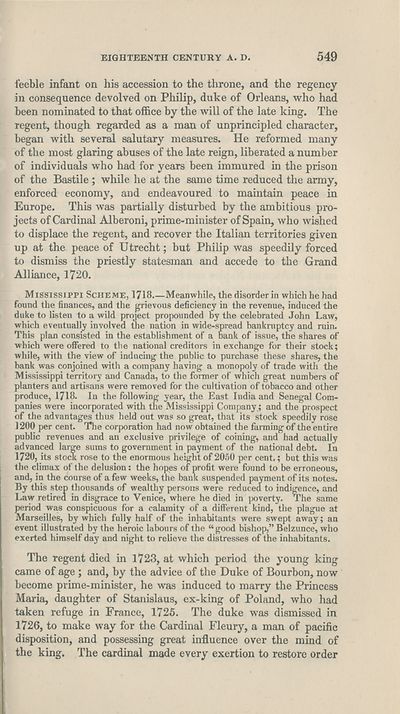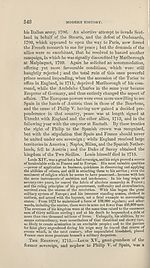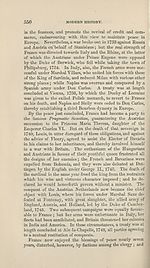Download files
Complete book:
Individual page:
Thumbnail gallery: Grid view | List view

EIGHTEENTH CENTURY A. D.
549
feeble infant on his accession to the throne, and the regency
in consequence devolved on Philip, duke of Orleans, who had
been nominated to that office by the will of the late king. The
regent, though regarded as a man of unprincipled character,
began with several salutary measures. He reformed many
of the most glaring abuses of the late reign, liberated a number
of individuals who had for years been immured in the prison
of the Bastile ; while he at the same time reduced the army,
enforced economy, and endeavoured to maintain peace in
Europe. This was partially disturbed by the ambitious pro¬
jects of Cardinal Alberoni, prime-minister of Spain, who wished
to displace the regent, and recover the Italian territories given
up at the peace of Utrecht; but Philip was speedily forced
to dismiss the priestly statesman and accede to the Grand
Alliance, 1720.
Mississippi Scheme, 1718 Meanwhile, the disorder in which he had
found the finances, and the grievous deficiency in the revenue, induced the
duke to listen to a wild project propounded by the celebrated John Law,
which eventually involved the nation in wide-spread bankruptcy and ruin.
This plan consisted in the establishment of a bank of issue, the shares of
which were offered to the national creditors in exchange for their stock;
while, with the view of inducing the public to purchase these shares, the
bank was conjoined with a company having a monopoly of trade with the
Mississippi territory and Canada, to the former of which great numbers of
planters and artisans were removed for the cultivation of tobacco and other
produce, 1718. In the following year, the East India and Senegal Com¬
panies were incorporated with the Mississippi Company.; and the prospect
of the advantages thus held out was so great, that its stock speedily rose
1200 per cent. The corporation had now obtained the farming of the entire
public revenues and an exclusive privilege of coining, and had actually
advanced large sums to government in payment of the national debt. In
1720, its stock rose to the enormous height of 2050 per cent.; but this was
the climax of the delusion: the hopes of profit were found to be erroneous,
and, in the course of a few weeks, the bank suspended payment of its notes.
By this step thousands of wealthy persons were reduced to indigence, and
Law retired in disgrace to Venice, where he died in poverty. The same
period was conspicuous for a calamity of a different kind, the plague at
Marseilles, by which fully half of the inhabitants were swept away; an
event illustrated by the heroic labours of the “good bishop,” Belzunce, who
exerted himself day and night to relieve the distresses of the inhabitants.
The regent died in 1723, at which period the young king
came of age ; and, by the advice of the Duke of Bourbon, now
become prime-minister, he was induced to marry the Princess
Maria, daughter of Stanislaus, ex-king of Poland, who had
taken refuge in France, 1725. The duke was dismissed in
1726, to make way for the Cardinal Fleury, a man of pacific
disposition, and possessing great influence over the mind of
the king. The cardinal made every exertion to restore order
549
feeble infant on his accession to the throne, and the regency
in consequence devolved on Philip, duke of Orleans, who had
been nominated to that office by the will of the late king. The
regent, though regarded as a man of unprincipled character,
began with several salutary measures. He reformed many
of the most glaring abuses of the late reign, liberated a number
of individuals who had for years been immured in the prison
of the Bastile ; while he at the same time reduced the army,
enforced economy, and endeavoured to maintain peace in
Europe. This was partially disturbed by the ambitious pro¬
jects of Cardinal Alberoni, prime-minister of Spain, who wished
to displace the regent, and recover the Italian territories given
up at the peace of Utrecht; but Philip was speedily forced
to dismiss the priestly statesman and accede to the Grand
Alliance, 1720.
Mississippi Scheme, 1718 Meanwhile, the disorder in which he had
found the finances, and the grievous deficiency in the revenue, induced the
duke to listen to a wild project propounded by the celebrated John Law,
which eventually involved the nation in wide-spread bankruptcy and ruin.
This plan consisted in the establishment of a bank of issue, the shares of
which were offered to the national creditors in exchange for their stock;
while, with the view of inducing the public to purchase these shares, the
bank was conjoined with a company having a monopoly of trade with the
Mississippi territory and Canada, to the former of which great numbers of
planters and artisans were removed for the cultivation of tobacco and other
produce, 1718. In the following year, the East India and Senegal Com¬
panies were incorporated with the Mississippi Company.; and the prospect
of the advantages thus held out was so great, that its stock speedily rose
1200 per cent. The corporation had now obtained the farming of the entire
public revenues and an exclusive privilege of coining, and had actually
advanced large sums to government in payment of the national debt. In
1720, its stock rose to the enormous height of 2050 per cent.; but this was
the climax of the delusion: the hopes of profit were found to be erroneous,
and, in the course of a few weeks, the bank suspended payment of its notes.
By this step thousands of wealthy persons were reduced to indigence, and
Law retired in disgrace to Venice, where he died in poverty. The same
period was conspicuous for a calamity of a different kind, the plague at
Marseilles, by which fully half of the inhabitants were swept away; an
event illustrated by the heroic labours of the “good bishop,” Belzunce, who
exerted himself day and night to relieve the distresses of the inhabitants.
The regent died in 1723, at which period the young king
came of age ; and, by the advice of the Duke of Bourbon, now
become prime-minister, he was induced to marry the Princess
Maria, daughter of Stanislaus, ex-king of Poland, who had
taken refuge in France, 1725. The duke was dismissed in
1726, to make way for the Cardinal Fleury, a man of pacific
disposition, and possessing great influence over the mind of
the king. The cardinal made every exertion to restore order
Set display mode to:
![]() Universal Viewer |
Universal Viewer | ![]() Mirador |
Large image | Transcription
Mirador |
Large image | Transcription
| Antiquarian books of Scotland > Education > Elements of universal history on a new and systematic plan > (569) |
|---|
| Permanent URL | https://digital.nls.uk/127586968 |
|---|
| Description | Thousands of printed books from the Antiquarian Books of Scotland collection which dates from 1641 to the 1980s. The collection consists of 14,800 books which were published in Scotland or have a Scottish connection, e.g. through the author, printer or owner. Subjects covered include sport, education, diseases, adventure, occupations, Jacobites, politics and religion. Among the 29 languages represented are English, Gaelic, Italian, French, Russian and Swedish. |
|---|

